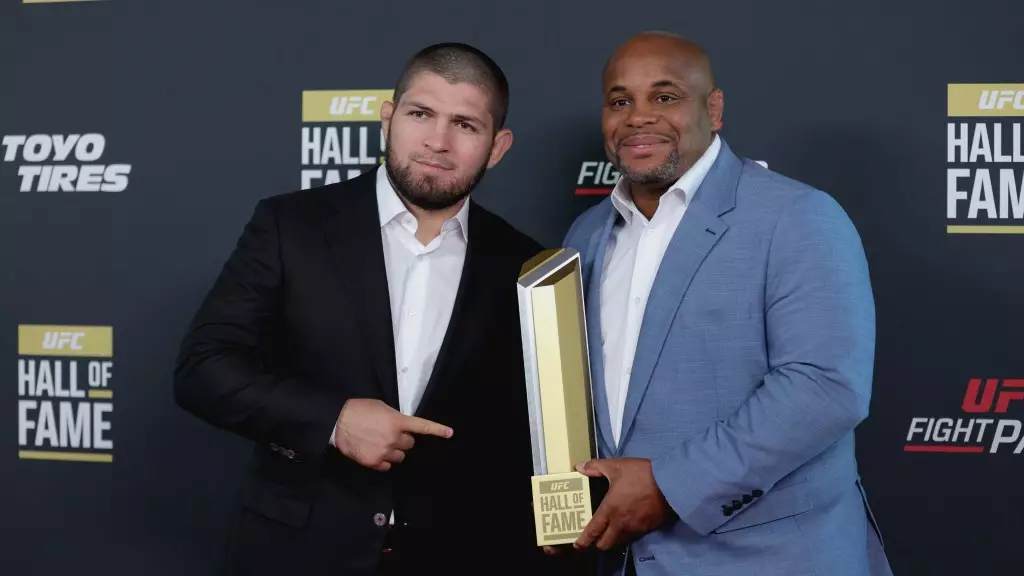In the world of Mixed Martial Arts (MMA), the relationships forged in the gym can often define the careers of fighters beyond their competitive records. Among those relationships, the bond between Daniel Cormier and Khabib Nurmagomedov stands out. Both being former UFC champions, Cormier and Nurmagomedov trained together at the esteemed American Kickboxing Academy, where they cultivated a deep mutual respect and loyalty that transcends typical camaraderie. However, the complexities of their professional lives intertwine with their personal values, especially regarding loyalty and rivalry.
Cormier’s long-standing rivalry with Jon Jones is perhaps one of the most notorious in UFC history. The tension between these two fighters has been marked by intense exchanges both inside and outside the octagon, and Cormier’s inability to fully reconcile with Jones continues to shape his views on loyalty. In contrast, Nurmagomedov has made it clear that his loyalty lies firmly with Cormier, showcasing a distinct cultural perspective on loyalty, friendship, and how conflicts impact personal relations.
The clash of cultures is palpable in Cormier’s interpretation of loyalty, especially concerning his interactions with rival fighters. In a recent discussion on his YouTube channel, he shared insights into how Americans often approach conflicts differently than fighters from other cultures. For instance, Cormier acknowledged a moment where he encountered Conor McGregor—his own rival—and shared a friendly exchange. This interaction did not align with Nurmagomedov’s view on how one should engage with adversaries, particularly when those rivals have hurt someone close to you, like Cormier himself.
Cormier articulated the discomfort that Nurmagomedov felt regarding his friendly demeanor towards McGregor, revealing a fundamental difference in perceptions of loyalty. While Cormier saw no issue in maintaining cordiality with McGregor, Nurmagomedov adhered to a more stringent code of conduct, suggesting that loyalties should remain unbroken. This cultural propensity for uncompromising loyalty is refreshing in an arena often characterized by shifting alliances and public personas.
The discussion brought forth by Nurmagomedov led Cormier to reevaluate his stance on interactions with rivals. Acknowledging Nurmagomedov’s perspective made Cormier conscious of the importance of loyalty in preserving interpersonal relations. He noted that he has since modified his behavior regarding McGregor, choosing to distance himself rather than seek out interactions that may seem contradictory to the camaraderie he shares with Nurmagomedov.
This admission is not simply an acknowledgment of a mistake but rather an evolving understanding of where true loyalty lies. Cormier’s commitment to nurturing his relationship with Nurmagomedov reflects a meaningful lesson learned from their years of training together. Instead of undermining the loyalty he holds towards his teammate, he chose to align more closely with the values that define Nurmagomedov’s approach to friendship and rivalry.
This emphasis on loyalty carries broader implications in the world of sports and personal relationships. The idea of picking sides can be seen as alien to many Americans, who often navigate the complexity of personal and professional ties with a flexible moral compass. However, Cormier’s stance, influenced by Nurmagomedov’s teachings, appears to advocate for a more steadfast sense of loyalty—one that demands a clear delineation between friends and foes.
Ultimately, the relationship dynamics between these fighters illuminate a broader conversation about loyalty in competitive sports. As professional athletes, the choices they make regarding whom to support, whom to challenge, and how to navigate rivalries can define their legacies both in and out of the ring. Cormier’s continual respect for Nurmagomedov serves as a reminder that in a sport rife with conflict, the virtues of loyalty, understanding, and cultural respect can forge stronger bonds that extend beyond personal rivalries. For both fighters, these lessons are not merely professional but touch the very essence of their identities as athletes and as men.

